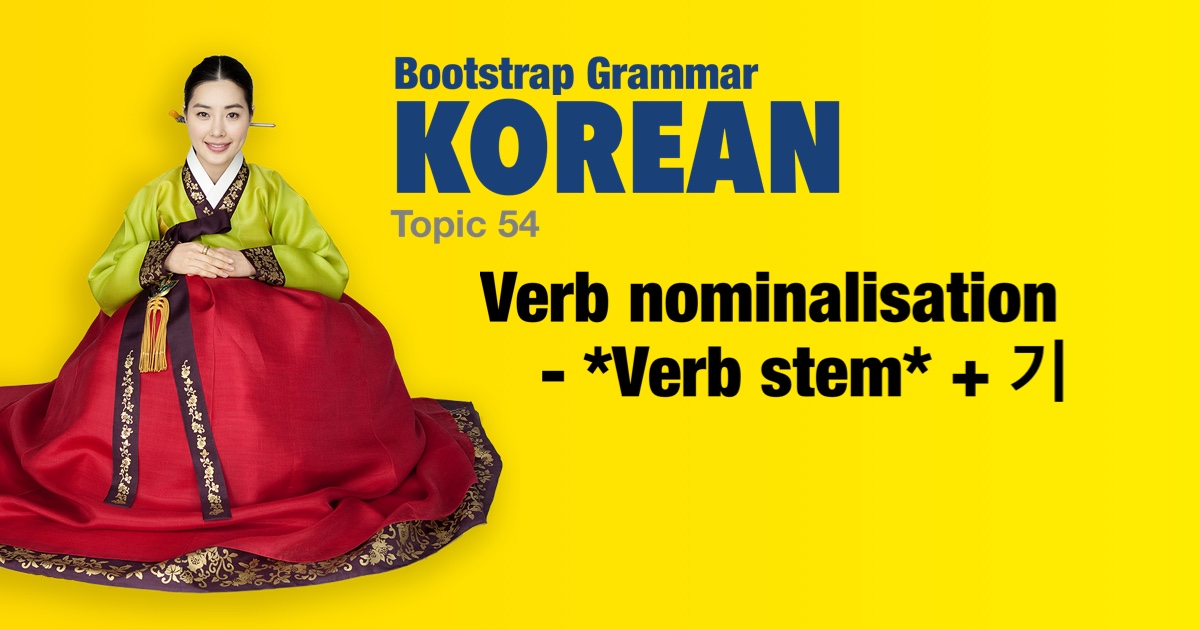Korean grammar - Verb nominalisation - *Verb stem* + 기 |
|||
|
|||
Pattern: Verb stem + 기 In English two verbs can be compounded by added a second verb in its infinitive form. For example 'He likes to eat' where 'to eat' is the second verb in its infinitive. In Korean this is done by converting the object verb into a noun (nominalization) using the Verb stem + 기 pattern. So 'to like to eat' becomes a noun (to like eating). -- So 먹기를 좋아해요 where 먹기 (먹 + 기) is the nominalised noun form. Note that this is similar to the gerund (것) pattern of forming nouns from verbs. But gerunds are most commonly only used as the object of descriptive verbs. In contrast the 기 form can be used form the object of both action verbs - like ~기 시작하다 (to start to) - and descriptive verbs - like ~기 싫다 (to not like to, to not want to). |
| Examples: | |
|
그녀는 오늘 아침에 학교에 가기 싫어해요.
She doesn't want to go to school every morning.
|
|
|
그는 아침 아주 일찍 먹기를 좋아해요.
He likes to eat very early in the morning.
|
|
|
저는 혼자 달리기를 할 거예요.
I'm going to run alone.
|
|
|
감기가 빨리 낫기를 바라요.
I hope (my) cold gets better soon.
|
|
|
우리 개는 목욕하기를 싫어해요.
Our dog hates to bathe.
|
|
|
한국어 말하기가 어려웠어요.
It was difficult to speak Korean.
|
|
|
여기서 택시 타기가 불편해요.
It is inconvenient to take a taxi from here.
|
|
|
한글 쓰기가 전혀 어렵지 않아요.
It is not difficult at all to write HanGul.
|
|
|
취미는 음악 듣기예요.
(My) hobby is listening to the music.
|
|
|
오늘은 밖에 나가기 너무 추워요.
It's too cold to go outside today.
|
|
|
여름에는 일찍 일어나기 쉬워요.
It's easy to get up early in summer.
|
|
|
저는 밥을 벌써 먹기 시작했어요.
(I) already started eating.
|
|
|
청소하기 싫어요.
I hate to clean.
|
|
|
러시아어를 배우기는 어려워요.
Learning Russian is difficult.
|
|
|
여자 친구는 제가 사과를 가져오기를 원해요.
(My) girlfriend wants me to bring apples.
|
|
|
모두 무사하기를 바라요.
I hope everyone is safe.
|
|
|
다시 보기를 희망해요.
Hope to see you again.
|
|
|
참기가 정말 힘들어요.
It's really hard to bear.
|
|
|
혼자 있기 싫어요.
(I) don't want to be alone.
|
|
|
집 찾기가 쉬웠어요.
It was easy to find the house.
|
|
 |
|




